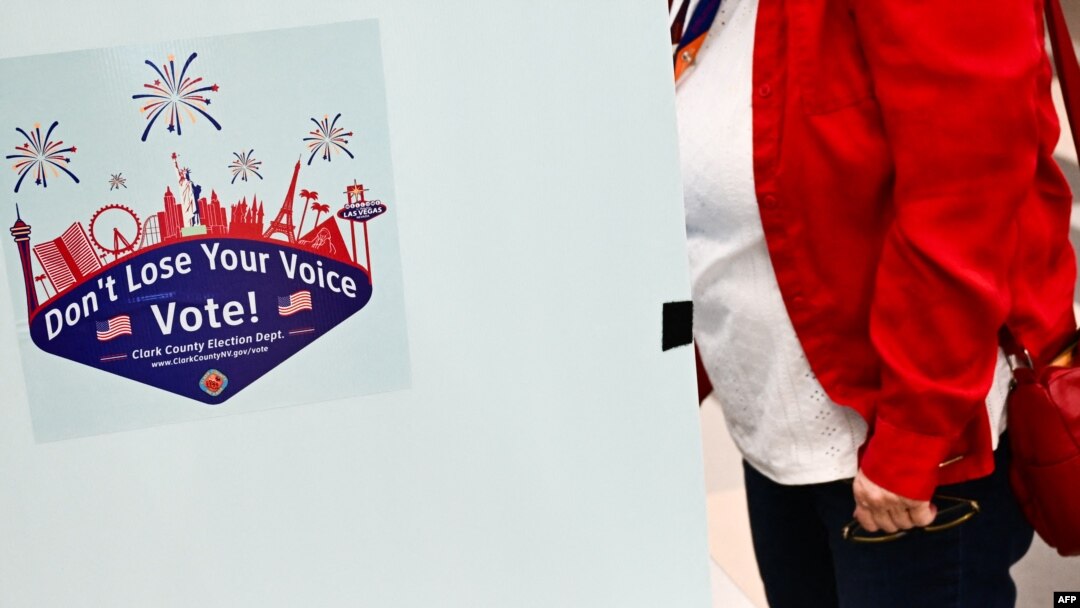Nikki Haley was swamped Tuesday in Nevada's symbolic Republican presidential primary as GOP voters resoundingly picked the "none of these candidates" option on the ballot in a repudiation of the former U.N. ambassador who is the last remaining major rival to front-runner Donald Trump.
Trump, the former president, didn't compete in the primary, which doesn't award any delegates needed to win the GOP nomination. He's instead focused on caucuses that will be held Thursday and will help him move closer to becoming the Republican standard-bearer.
That leaves the Republican results on Tuesday technically meaningless. But they still amount to an embarrassment for Haley, who has sought to position herself as a candidate who can genuinely compete against Trump. Instead, she became the first presidential candidate from either party to lose a race to "none of these candidates" since that option was introduced in Nevada in 1975.
Haley had said beforehand she was going to "focus on the states that are fair" and did not campaign in the western state in the weeks leading up to the caucuses. Her campaign wrote off the primary results with a reference to Nevada's famous casino industry.
"Even Donald Trump knows that when you play penny slots the house wins," spokeswoman Olivia Perez-Cubas said. "We didn't bother to play a game rigged for Trump. We're full steam ahead in South Carolina and beyond."
Trump joked on his social media network, "Watch, she'll soon claim Victory!"
Nevada Gov. Joe Lombardo, a Republican, had announced beforehand that he would vote for "none of these candidates" on Tuesday. Several Republicans interviewed heading to the polls said they intended to do the same.
Washoe County Republican Party Chair Bruce Parks, who pushed for the GOP to hold caucuses, said that he told voters who called his office — and Trump supporters — to participate in the primary by voting for "none of these candidates" over Haley.
"They basically told us they don't care about us," Parks said in an interview after the race was called. "By marking 'none of these candidates,' we respond in kind — we don't care about you either."
The Associated Press declared "None of these candidates" the winner at 12:01 a.m. on Wednesday based on initial vote results that showed it with a significant lead over Haley in seven counties across the state, including in the two most populous counties.
There was also a Democratic primary on Tuesday that President Joe Biden easily won against author Marianne Williamson and a handful of less-known challengers. Rep. Dean Phillips of Minnesota was not on the ballot.
Biden issued a statement thanking Nevada voters for their support and, with an eye toward an expected matchup in November, warned that Trump is trying to divide America.
"I want to thank the voters of Nevada for sending me and Kamala Harris to the White House four years ago, and for setting us one step further on that same path again tonight. We must organize, mobilize, and vote. Because one day, when we look back, we'll be able to say, when American democracy was a risk, we saved it — together," Biden said.
Nevada lawmakers added "none of these candidates" as an option in all statewide races as a way post-Watergate for voters to participate but express dissatisfaction with their choices. "None" can't win an elected office, but it came in first in primary congressional contests in 1976 and 1978. It also finished ahead of both George Bush and Edward Kennedy in Nevada's 1980 presidential primaries.
The caucuses on Thursday are the only Nevada contest that count toward the GOP's presidential nomination. But they were seen as especially skewed in favor of Trump because of the intense grassroots support they require from candidates and new state party rules that benefitted him further.
Trump is expected to handily win the caucuses, which should deliver him all 26 of the state's delegates. Delegates are party members, activists and elected officials who vote at the national party conventions to formally select the party's nominee.
"If your goal is to win the Republican nomination for president, you go where the delegates are. And it baffles me that Nikki Haley chose not to participate," Trump's senior campaign adviser Chris LaCivita said in an interview before the primary.
Nevada, the third state in the field after Iowa and New Hampshire, was set to hold a state-run primary election instead of party-run caucuses after Democrats controlling the Legislature changed the law to try to boost participation.
Caucuses typically require voters to show up for an in-person meeting at a certain day or time, while elections can offer more flexibility to participate, with polls open for most of the day on Election Day, along with absentee or early voting.
But Nevada Republicans chose to hold party-run caucuses instead, saying they wanted certain rules in place, like a requirement that participants show a government-issued ID.
The caucuses require a candidate to intensely organize supporters around the state to be competitive, a feat that Trump, the former president and prohibitive front-runner, was easily positioned to do.
The Nevada GOP also restricted the involvement of super PACs like the one Florida Gov. Ron DeSantis was relying on to boost his now-suspended campaign. And the party barred candidates from appearing both on the primary ballot and in the caucuses.
Former Vice President Mike Pence and South Carolina Sen. Tim Scott also signed up to compete in Nevada's primary instead of the caucuses before ending their presidential campaigns.


